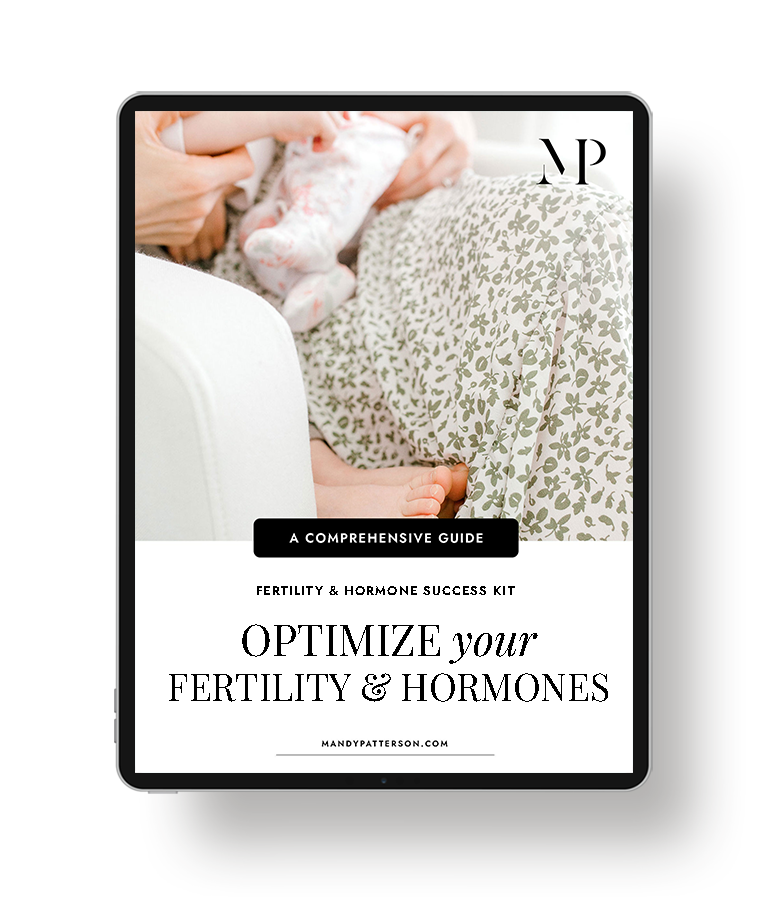Infertility hurts. It’s a pain like no other. It doesn’t discriminate between the excited 23 year old who just got married and wants to start a family and the 35 year old who is exhausted, she’s been trying for the last three years. Add that on top of expensive Infertility treatments that are also an emotionally draining experience. Sweet friend, I’m here to tell you that you are not alone in your pain.
There are alternatives to conventional infertility treatments. A functional medicine approach to infertility could be just what your body needs to get back to optimal health and fertility. In this article, we’ll discuss medical infertility and common infertility treatments. Then, we’ll deep dive into a functional medicine approach and I’ll leave you with five steps you can take right now to support your fertility! Ready? Let’s get started!
Medical Infertility
Infertility is described as the inability to get pregnant after a year of unprotected intercourse. According to the CDC, about 6% of married women are unable to get pregnant after a year of trying, and 12% have difficulty getting pregnant, which is called imparied fecundity. The problem doesn’t just concern women. In 35% of couples with infertility a male factor was found in addition to a female factor.
Factors of male infertility include:
- Abnormal sperm production or function from diabetes or genetics.
- Problems with the delivery of sperm.
- Overexposure to environmental toxins like pesticides, chemicals, radiation, cigarette smoke, alcohol, marijuana, anabolic steroids, and taking medications to treat bacterial infections.
- Sperm damage related to cancer treatment.
Factors of female infertility include:
- Ovulation disorders such as PCOS, hyper or hypo-thyroid, over-exercising, low body fat and eating disorders.
- Uterine or cervical abnormalities that can block the fallopian tubes or stop a fertilized egg from implanting in the uterus.
- Fallopian tube damage or blockage from pelvic inflammatory disease, endometriosis or adhesions.
- Endometriosis may affect the function of the ovaries, uterus and fallopian tubes.
- Early menopause.
- History of cancer treatment.
It’s important to note that every couple is unique and will have individual challenges to overcome. But, if you have available eggs and your partner has viable sperm, there is no reason you should be infertile. There is a reason this very natural process isn’t working.
Common Medical Interventions
There are a range of conventional medical interventions for patients dealing with infertility. Generally, the first step is to meet with a reproductive endocrinologist and explore all the known infertility factors. Often, in the absence of clear diagnostic reasons, a doctor will diagnose a couple with “unexplained infertility.” Yeah, I know, that leaves you feeling uncertain and frustrated.
The next step is to offer patients fertility drugs to stimulate the release of eggs. If the fertility drugs do not work, then options like IUI and IVF are considered. IUI refers to intrauterine insemination, where sperm cells are put directly into your uterus around the time you’re ovulating. IVF refers to In Vitro Fertilization, which is the process of fertilization by extracting eggs, retrieving a sperm sample, and then manually combining an egg and sperm in a laboratory dish. The embryo is then transferred to the uterus for implantation.
IVF is often brought to the table as a “last ditch effort” for couples to conceive. Many are open to fertility drugs, but as the options shrink so does the openness to mechanical intervention.
What is Functional Medicine?
A functional medicine approach can help couples at any stage of their fertility journey. Couples who are in the family planning stage can benefit just as much as those couples who have already gone through all the conventional treatments. Why is that? A functional medicine approach addresses the root cause of infertility.
Most of the time infertility has its roots in one of the following four areas:
- Digestive function and gut health
- Detoxification
- Insulin and blood sugar imbalances
- Adrenal health and stress
Functional medicine is a holistic approach that provides natural fertility solutions while attempting to get to the underlying cause. Rather than prescribe fertility drugs that often just act as a bandaid to the real cause of infertility, functional medicine providers will prescribe a whole-body, natural protocol that both you and your partner can implement.
A Functional Medicine Evaluation of Infertility
Here are a few examples of the ways a functional medicine evaluation of infertility is different from the conventional approach.
Highly inflammatory diet – an inflammatory diet is the suspect in any negative condition in the body. Recently, a Harvard study proposed a healthy diet as a suggestion to increase the odds of conceiving. We’ll talk about a fertility diet in the sections below.
Functional PCOS – Oftentimes women will not have the normal symptoms of PCOS but still suffer from compromised egg release. Many women float below the radar for PCOS but still have high androgen hormones.
Estrogen dominance – this can affect both males and females and causes sub-optimal fertility due to an unbalanced ratio of estrogen to other hormones.
Functional thyroid issues – to reach the medical “disease” qualifying range for a thyroid issue you are already well out of the normal range. Many patients will fall through the cracks here as well, but once their thyroid is back under control, so is their fertility.
Other issues that a functional medicine approach addresses where conventional medicine falls behind include: toxic metal syndrome, methylation disorders, systemic inflammation, stress hormone imbalances, poor body composition, and vitamin deficiency.
Functional Medicine for Fertility
Research shows that integrated infertility patient care through both collaboration with alternative medicine practitioners and incorporation of holistic, individualized and interdisciplinary approaches greatly benefits infertility patients. So, what does this type of care actually look like?
First, there are a myriad of different diagnostic tests that a functional medicine provider can draw up to look at your health holistically. These tests will go more in depth on things like vitamin and nutrition deficiencies, food sensitivities, thyroid disorders, hormonal imbalances, and gut disorders.
Then, your practitioner will create a plan to address those areas that are deemed problematic. One way this is done is through what’s called a fertility diet. This is basically a personalized nutrition plan that will help heal those root causes that may be affecting your fertility. Research shows that the dietary intake of certain foods is related to the time it takes women to become pregnant.
5 Steps You Can Take Right Now

Antioxidants and phytonutrients in plants have been shown to boost fertility so make sure you are getting 8-12 servings of fruits and vegetables in your diet everyday. It is important to eat a variety of color and focus on an abundance of rich leafy greens.
This all sounds great, Mandy, but what can I do RIGHT NOW that will help my fertility. I’m glad you asked! Functional medicine works best when you take charge of your health so let’s discuss some steps you can take that will help in addition to working with a functional medicine provider.
- Eat Real Food – drop the processed crap and get back into the kitchen. Trust me, it’s worth it for your health, plus cooking can be a fun skill to have!
- Balance Blood Sugar – this means limiting refined carbohydrates, pairing carbs with fat and protein and focusing on real food.
- Eat Plants – antioxidants in plants have been shown to support fertility so don’t avoid your daily greens.
- Choose Quality Protein – options like grass-fed beef, wild-caught fish, and pastured eggs will get you those 80 grams of protein per day needed to support fertility.
- SLEEP – melatonin impacts egg quality and hormone function so make sure to get enough sleep.
If you’re ready to tackle your infertility head on, reach out to me via my contact page. As a Naturopathic Doctor and Certified Holistic Health Coach I’ll help you get to the root cause of infertility and walk with you on your journey to healing every step of the way!

















